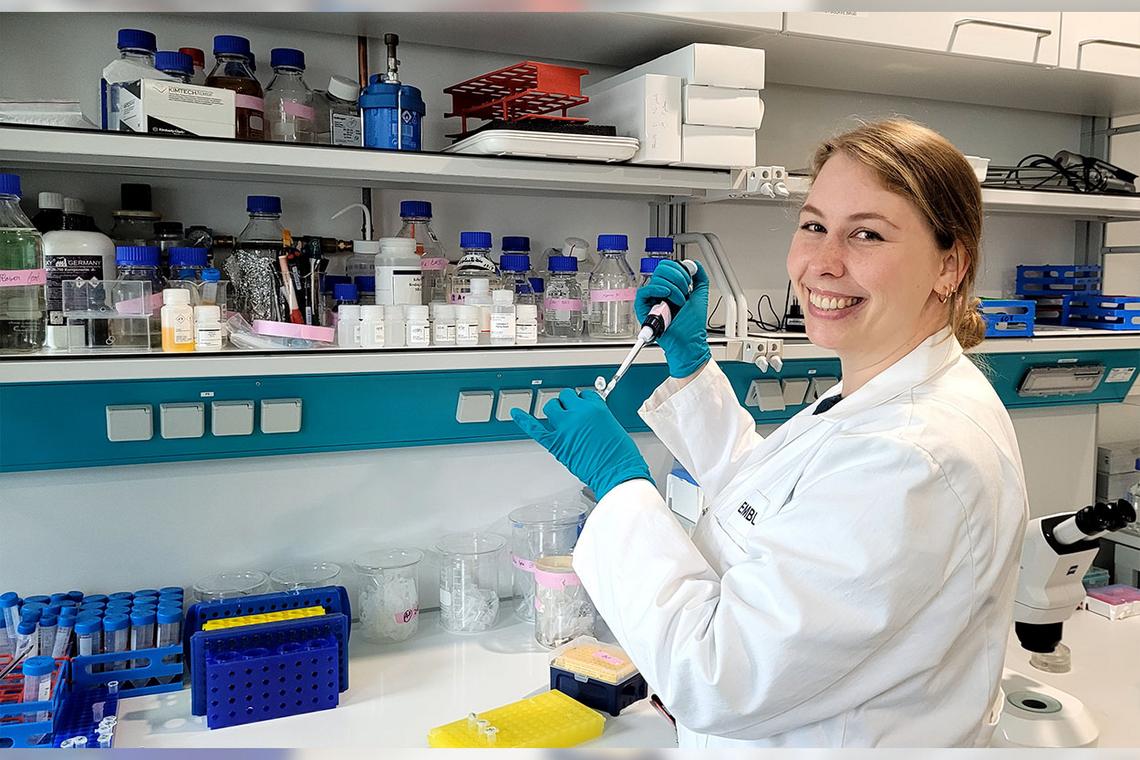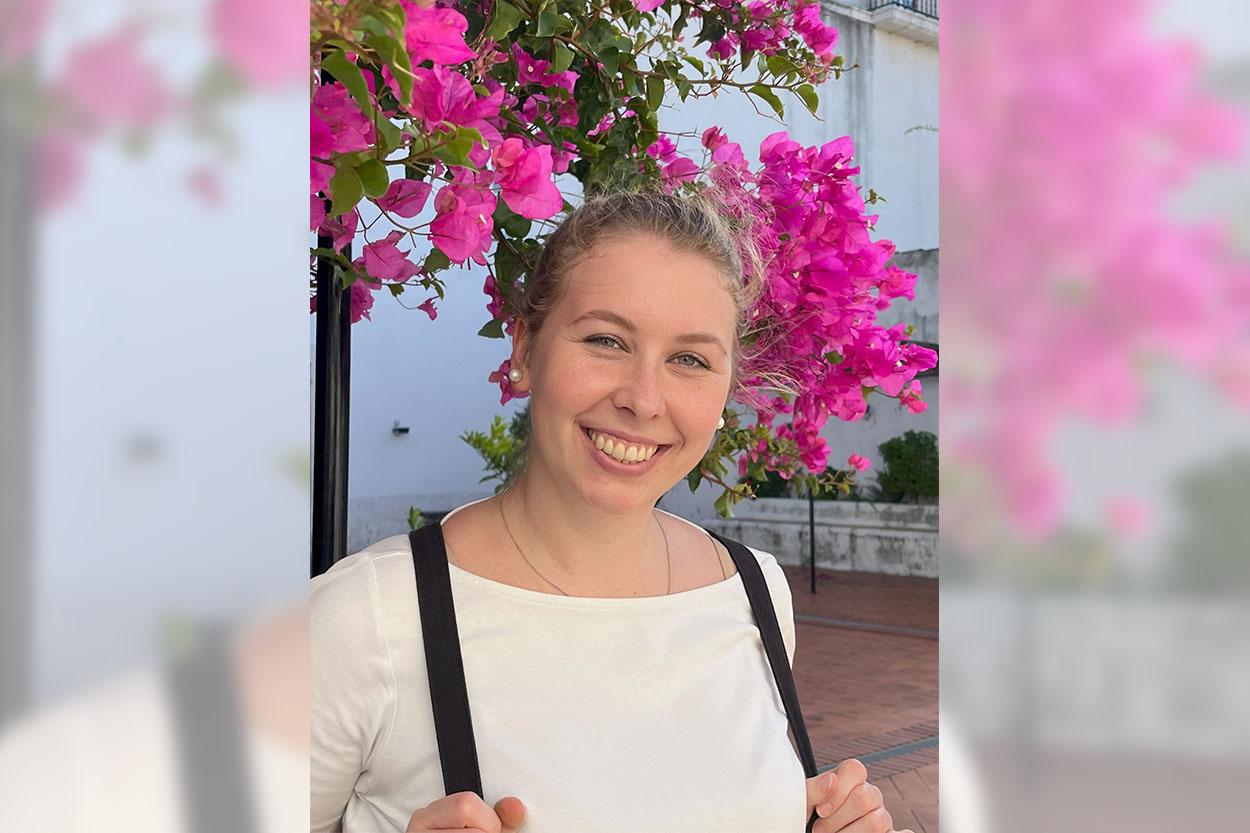Story
„Understand what drives you!“

Why did you decide to study at IMC Krems back then? What were the deciding factors?
I chose to study at a university of applied sciences because of the structured schedule and the availability of fixed places for lab practicals. Among other options, IMC stood out to me for several reasons: the lectures were conducted entirely in English, which would prepare me well for the future steps; an internationally diverse environment; and the lectures had a focused approach to the subject matter. My decision was definite when I came to the interview and experienced the welcoming and friendly atmosphere first-hand. I was particularly excited when Prof. Dr. Harald Hundsberger offered to give us a tour through the labs after the interview.
In hindsight, I learnt that landing a PhD position with a degree from a university of applied sciences is not so easy and that the IMC has a really good reputation also in the scientific community.
What will you talk about in your presentation at the Life Science Meeting 2024?
I will speak about my PhD project. While 20 minutes is quite limited, I will try my best to give a sneak peek into what I have been working on in the last years.
First, I am excited to talk about my research, but I am also looking forward to the round table discussion, share my experiences, reconnect with former professors and colleagues, and interact with the current students. I see this also as an opportunity to offer support and my network to students considering a career in academia or contemplating studying in Heidelberg, Cambridge or abroad.
What do you value about the Life Science Meeting and what do the students benefit from?
As a student, I found it incredibly exciting to explore the diverse range of job opportunities available upon completing my degree. I valued the chance to gain insights into what to expect after graduation, stay updated on current research and advancements of the pharma industry/biotechnology, and expand my network by interacting with fellow students and speakers. Additionally, these events enhance the visibility of IMC by inviting speakers from various fields and contribute to a dynamic and enriching learning environment.
Which specific research projects or studies have particularly fascinated you since graduating in Medical and Pharmaceutical Biotechnology?
I find myself naturally inclined towards projects focusing on human diseases involving immunology, neuroscience, regenerative medicine, and, of course, fibrosis. What really fascinated me in the recent years was the collective effort witnessed during the Covid-19 pandemic. Seeing the collaborative spirit and rapid progress made by scientists worldwide was truly inspiring. It showcased the remarkable power of teamwork and cooperation in advancing scientific knowledge swiftly, effectively and driving scientific innovation forward. This experience left a deep impression on me.
Can you tell us about your current work and research activities at EMBL?
My main project focuses on kidney fibrosis, a serious health condition that affects more than 10% of the world's population and leads to millions of deaths each year. Fibrosis occurs when scar tissue forms, and one of the cell types involved, called myofibroblasts, is responsible for this excessive scarring. Despite progress in understanding chronic kidney disease (CKD), we still lack specific treatment options, and current methods for diagnosing the disease are not very effective in detecting it early or assessing the extent of kidney damage accurately. This means that there is an urgent need for better ways to identify the disease sooner and understand how it progresses, so that new treatments can be developed.
Therefore, my goal was to better understand the disease mechanisms behind kidney fibrosis. More specifically, I used a model that mimics the condition in cell culture and observed how cells responded to triggers that cause fibrosis. By looking at changes in genes and proteins over time and using an integrative data analysis approach, I found potential new markers for the disease and tested possible treatments in further experiments. While the study is still ongoing, it provides deeper insights into the development of kidney fibrosis and offers hope for new treatments for CKD.
How has your career developed since you graduated and what milestones have you reached along the way?
After I graduated from IMC, I stayed a few more months in the lab that I did my master’s thesis in, to further develop the project. Then I began my PhD journey at EMBL. A significant milestone was recently reached as I submitted my thesis and am now eagerly awaiting my defence in the coming weeks. While I had a solid foundation in conducting experiments and gathering knowledge from literature, thanks to my studies at IMC and internships, it was important to me to enhance my data analysis skills. Through the interdisciplinary nature of my PhD project and the support of my colleagues, I successfully achieved this goal. Throughout my PhD, I also had the opportunity to expand my skill set much further. Collaborating with other students and fellow PhD representatives, we organized conferences, social events and other projects to aimed to enhance the overall PhD experience at EMBL.
What breakthrough developments or innovations in biotechnology do you think have the potential to change the healthcare industry for good, and how could you contribute to this?
There are quite some promising developments currently happening in the field of biotechnology. Over the past few decades, an immense volume of data has been generated, especially with the emergence of multi-omics datasets. As artificial intelligence continues to advance, we are already witnessing clinical trials based on compounds that were identified through AI-powered target discovery platforms. It is a thrilling time to witness the convergence of data-driven insights and cutting-edge technology shaping the future of healthcare.
Within biotechnology, I anticipate that gene therapy and cell therapy will emerge as increasingly prominent topics. In my own work focused on fibrosis, a critical aspect is the extracellular matrix, or scar tissue, as mentioned earlier. This matrix not only offers structural support but is essential for the functioning of any organ. To evaluate the effects of drug compounds, for example those identified through AI-driven platforms, rigorous testing in physiologically relevant models is crucial before advancing to human clinical trials. Enhancing cell culture models represents a significant opportunity, not only for reducing reliance on animal models but also for advancing regenerative medicine initiatives.
Can you tell us something about your personal connection to biotechnology? What inspired you to specialize in this field?
During my biology, physics and chemistry classes at school, a passion for life sciences ignited within me. It was when I realized that I cannot just understand nature’s wonders but that one could harness them for humanity’s benefit. From providing insulin to diabetes patients to combating a myriad of diseases, in short: the potential to make a real difference awoke my passion.
What advice would you give to prospective biotechnology students who want to pursue a career similar to yours?
Understand what drives you. Often this might be hard but take the next step and keep moving to broaden your horizon and find out what motivates you.
Stay open-minded, seize opportunities to learn and grow, both professionally and personally.
Recognize the importance of your time and invest it wisely. Focus on acquiring skills that will be valuable for your career progression and do not forget to enjoy life.
Persistency is key, so do not let self-doubt hold you back. Take the risk and apply for positions even though you might not be fully qualified.
Invest time to build a (support) network, surround yourself with peers, mentors and colleagues who can offer guidance throughout your journey. Whether it is in a PhD program or with other like-minded people. Likewise, provide support to others and strengthen the connections of your social network.
Medical and Pharmaceutical Biotechnology bachelor degree programme
Medical and Pharmaceutical Biotechnology master degree programme


